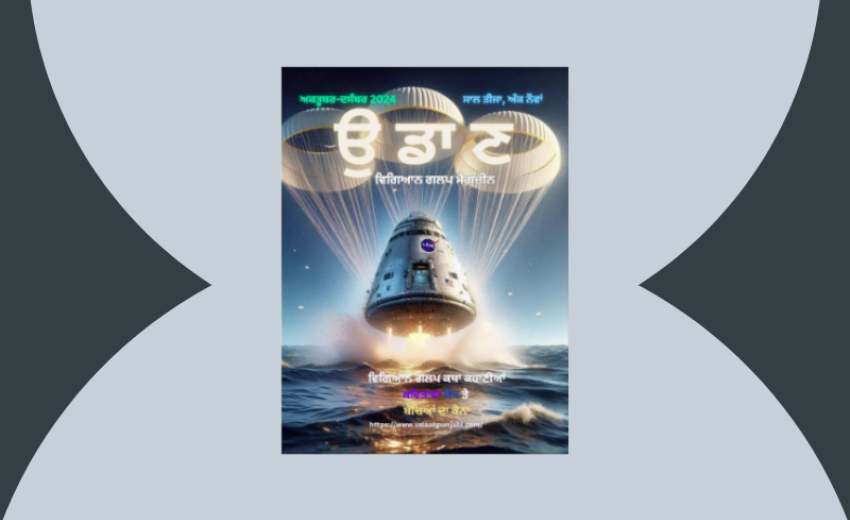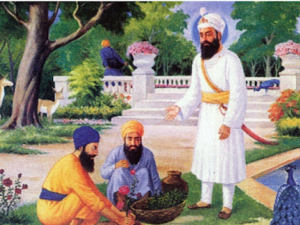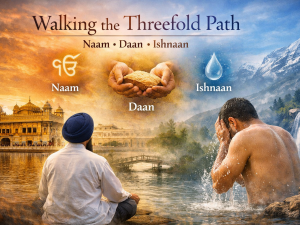Udaan is a quarterly magazine dedicated to advancing Science Fiction (SF) literature in the Punjabi language. Over the past two years, the magazine has made notable contributions to the realm of speculative fiction, offering readers unique stories, scientific essays, and children’s content. Now entering its third year, the Oct.-Dec. 2024 issue continues this tradition, presenting the works of prominent Punjabi writers, along with science-oriented content. This report highlights the structure and content of the magazine’s latest issue, focusing on the key stories, essays, and children’s section that promote both scientific knowledge and creative storytelling.
1. Story Section: Exploring Sci-Fi Themes: The main section of the magazine is dedicated to science fiction stories written by Punjabi authors. Each narrative blends science with imaginative elements, addressing thought-provoking themes.
- “A Strange Encounter” by Dr. Devinder Pal Singh (Canada): In this story, an environmental scientist on Earth encounters an alien being who reveals the origins of life on Earth. The alien emphasizes humanity’s responsibility to safeguard the planet’s ecosystem, resonating deeply with contemporary environmental concerns. The story presents an intriguing mix of environmentalism and extraterrestrial life, encouraging readers to reflect on their role in protecting Earth’s fragile balance.
- “Reincarnation” by Ajmer Sidhu (India): Sidhu’s story illuminates the exploitation of vulnerable individuals through beliefs in reincarnation. It examines how unscrupulous parties manipulate people’s superstitions for personal gain. Sidhu critiques the intersection of religion, gullibility, and exploitation through this lens, delivering a moral narrative about societal challenges.
- “Purple Mask” by Roop Dhillon (England): This futuristic tale introduces a world where cyborgs are integral to human society. Dhillon explores the dynamics between humans and artificially enhanced beings, asking philosophical questions about the boundaries of technology, identity, and ethics. The theme of human-cyborg relationships offers insights into the potential future of technology in daily life.
2. Science Essays: Connecting Technology and Society: In addition to fiction, Udaan offers scientifically driven essays that cater to readers eager to learn about cutting-edge technology and societal impacts.
- “Quantum Computing Technology” by Prof. Satbir Singh (India): This essay provides an accessible yet insightful explanation of quantum computing. Singh elaborates on how quantum computers differ from traditional systems and their potential applications in everyday life. Singh’s essay underlines the transformative power of this technology, from healthcare to data processing, making complex topics approachable to a broad audience.
- “India’s Second Spaceport” by Dr. Surinder Kumar Jindal (India): Focusing on India’s burgeoning space exploration sector, Jindal discusses the construction of the country’s second spaceport, developed by a private company. His essay looks at India’s growing role in the global space race and the strategic importance of private sector involvement in this domain.
- “Importance of Media Literacy in the Age of Social Media” by Amandeep Singh (USA): Amandeep Singh emphasizes the need for media literacy in an era where social media often shapes public opinion and knowledge. He discusses how misinformation can spread quickly and the critical role of media literacy in helping individuals navigate the digital age. Singh’s essay is timely, highlighting a crucial societal issue.
3. Children’s Section: Nurturing Science and Creativity: The third section of the magazine is geared towards children, combining imaginative stories with scientific themes to inspire young minds.
- “The Falling of Old Leaves” by Amandeep Singh (USA): A simple yet beautiful story about leaves changing colours during the Fall season, aimed at introducing children to the cycle of seasons and the natural world.
- “Harkho Cat and Hightech Mice” by Hari Krishan Mayer (Canada): In this clever story, a mice devise a high-tech plan to outsmart an intelligent cat. The story combines humour with ideas of innovation and teamwork, making it entertaining and educational for young readers.
- “Dipi Get Rid of Ghosts” by Amarhit Singh Jheeta (India): Jheeta’s story dispels myths about ghosts, teaching children to question superstitions and approach the world with a scientific mindset.
- “A Stroll on Venus” by Dr. Devinder Pal Singh (Canada): In this story, a child named Ruban explores Venus. Singh introduces readers to the planet's unique features, combining a child’s sense of adventure with accurate planetary science.
Poetry Section: In addition to the stories, the children’s section includes two poems, “Sun” and “Moon,” by Vikas Verma (India) and “Fax Machine” by Hari Krishan Mayer (Canada). The poems explore celestial bodies and technology, making abstract concepts more relatable for children.
4. Book Review Section: Highlighting Environmental Themes: The magazine also features a book review of We the Living Animals (Parts 1 and 2), written by Principal Hari Krishan Singh Mayer and reviewed by Dr. Devinder Pal Singh. The books describe various animals' characteristics in poetic form and reflect on their current state, likely aiming to raise awareness about environmental and conservation issues.
5. Science and Science Fiction News: The final section of the magazine contains the latest developments in science and science fiction, providing readers with current news related to these fields. This portion of the magazine bridges fictional stories and real-world scientific advancements, keeping readers informed about the latest trends in technology and space exploration.
Conclusion: With its blend of science fiction stories, informative essays, and children’s literature, Udaan magazine offers an engaging platform for promoting science in the Punjabi language. The current issue's stories are particularly notable for exploring futuristic themes, ethical dilemmas, and the intersection of science and society. Meanwhile, the children’s section nurtures curiosity and critical thinking, laying the groundwork for future generations to appreciate both science's wonder and storytelling's power.
******





